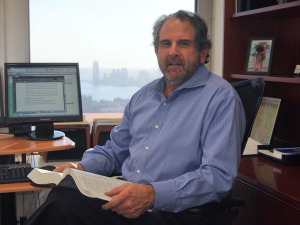The practice of law opens the door to multiple career opportunities, says Henry Kelston of Nyack, a partner in Milberg LLP, a law firm representing plaintiffs in class actions and other complex litigation.
The Nyack resident began his law career after graduating cum laude with a Bachelor of Science degree from Tufts University and from New York University”™s School of Law. He went into the practice of law, interrupted his law career to become an entrepreneur for eight years, then returned to law, this time with Milberg.

Kelston is presently working on class actions brought by several mothers concerned about inaccurate food labeling. The cases involve three firms that labeled their products as all “natural” while they were made largely from genetically modified ingredients, he says.
“Natural foods are more expensive than others,” he says. “Although the suits may cost the offending companies millions, when divided among the many people affected, it amounts to a relatively small amount for each individual. But class actions can have ripple effects, helping to shape public policy and discourage bad corporate behavior.
“Each action has individuals who have agreed to act as representatives for the class,” Kelston says. He points out that these people have to be prepared for the long haul, “because these cases have a long life.” Locating individuals affected by a pending suit is a specialty in itself, he adds. “We post notices in appropriate magazines, websites and social media.”
In addition to being a litigator and class-action specialist, Kelston is also involved in electronic discovery. “This is the practice of identifying, collecting and exchanging electronic information ”” locating documents and where (they are) stored,” he explains.
Looking back, Kelston recalls, “During my second summer at law school I worked for a law firm, assigned to do some work in labor relations. A third generation had taken over a family-owned foundry and made the employees so unhappy that they sought to unionize,” he says. His law firm represented the foundry. Kelston says the problem was solved by impressing on the new generation of owners the need for less arrogance and greater consideration of employees. “On my last day of work the employees actually decided not to unionize,” he says.
“The field of labor law is changing,” he says after working full time in labor law. “It”™s more about discrimination litigation, which I found less satisfying.”
After also working in entertainment law, Kelston decided to become an entrepreneur. He had a role model in his father, who owned a small leather trimming factory in Brooklyn, aided by his wife as bookkeeper.
Kelston”™s then-3-year-old son inspired his first invention. “The cardboard juice boxes presented a problem in a child”™s hands,” he says. “A light squeeze sent juice spurting all over. I designed and patented the first plastic juice holder. I also developed a few other lunch box items. I only intended to remain in business for a couple of years, but it stretched into eight. Launching a business is an education. A small-business owner needs to learn product design, production methods, inventory control, sales and public relations.”
As competing products came on the market, Kelston decided to phase out and return to law.
The Kelston family does boast two remaining entrepreneurs. Kelston”™s Swedish-born wife, Marie Burewall, owns her own business helping to promote foreign destinations for international meetings and incentive travel. Their daughter, Annie, opened a doula center helping pregnant women and their partners through pregnancy and childbirth. Son Jake is assistant manager at Whole Foods, and son Nick develops new business for a digital marketing agency.
Challenging Careers focuses on the exciting and unusual business lives of Hudson Valley residents. Comments or suggestions may be emailed to Catherine Portman-Laux at cplaux@optonline.net.
















